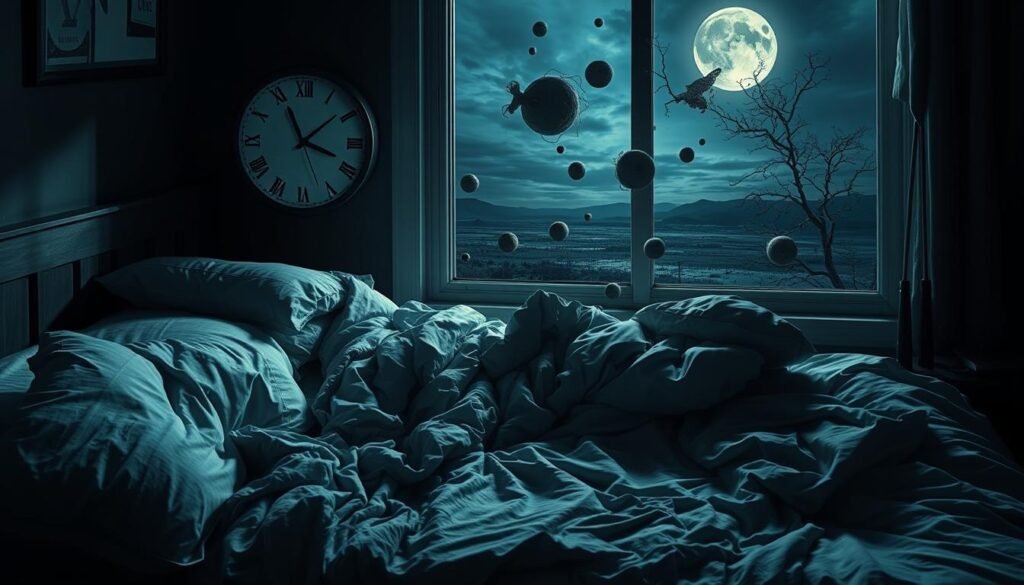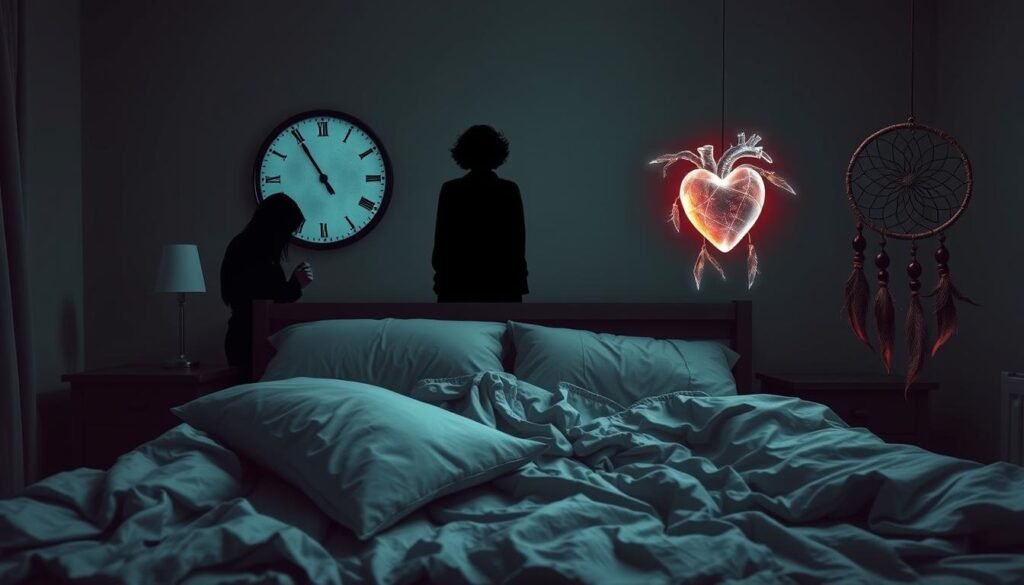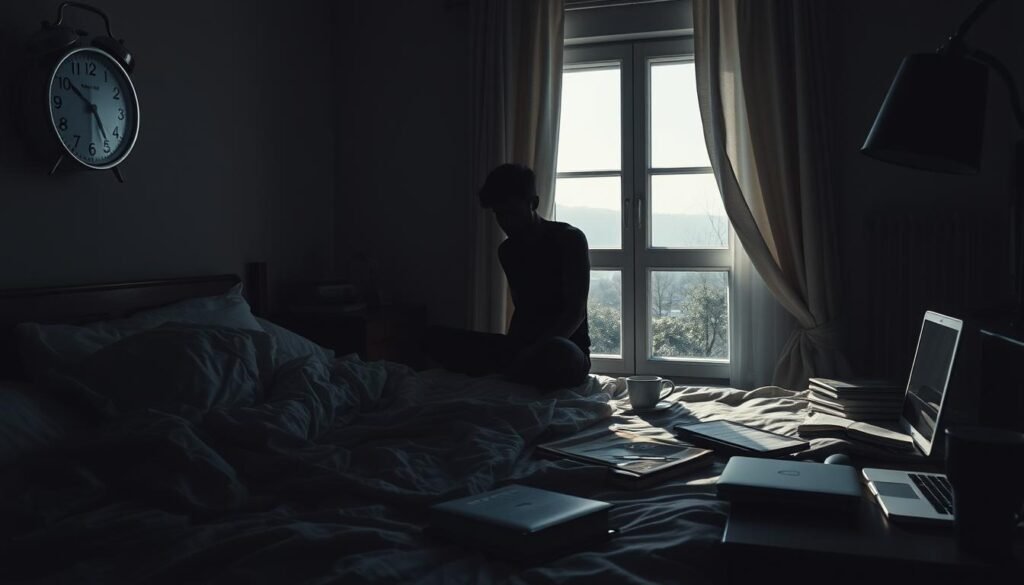About one-third of adults in the U.S. have insomnia symptoms, with 4-22% truly having an insomnia disorder. More than 50 million Americans deal with chronic sleep disorders. Understanding insomnia and its effects on mental health is crucial, as it often occurs alongside mental health problems, affecting one’s well-being.
This guide will examine the connection between insomnia and mental illness. It will look at how sleep issues may relate to depression, anxiety, and PTSD. Knowing this link is vital for effective treatment and a better life. For more insights, you can visit the Sleep Foundation.
Key Takeaways
- Insomnia symptoms affect about one-third of U.S. adults.
- 50 million Americans are diagnosed with chronic sleep disorders.
- Approximately 40 to 50% of those with insomnia also have a mental health disorder.
- Sleep problems impact various age groups differently.
- Understanding the link between insomnia and mental health is vital for effective treatment.
- Cultivating good sleep habits can help mitigate insomnia challenges.
Understanding Insomnia and Its Types
Insomnia is a common sleep issue that many people face. The term insomnia definition means having trouble falling or staying asleep. This can disrupt your day-to-day life. Knowing about the different kinds of insomnia is important for understanding how they affect your health.
Definition of Insomnia
Insomnia includes various symptoms, like not being able to sleep well. It’s mainly seen as either acute insomnia or chronic insomnia. It can happen for many reasons, such as stress, changes in your life, or health problems. If it’s not treated, insomnia can hurt your ability to think, remember things, and stay healthy, which could cause more issues later on.
Chronic Insomnia vs. Acute Insomnia
Chronic insomnia means having trouble sleeping for three nights a week, lasting three months or more. It can come from ongoing stress or bad sleep habits that you haven’t fixed. Meanwhile, acute insomnia is shorter, under three months, usually caused by big life events or health troubles. Knowing the difference between them can help find the right way to deal with each.
How Are Insomnia and Mental Illness Connected?
Insomnia links tightly with several mental health issues, showing a bidirectional relationship. It is both a symptom and a factor that worsens mental health problems. Meanwhile, mental illnesses are major causes of sleep issues. Knowing this helps us spot symptoms early and get help sooner.
The Bidirectional Relationship
The American Psychiatric Association says 40-50% of people with insomnia have a mental health condition too. Depression makes this link even clearer, with up to 90% experiencing sleep problems. Anxiety adds to the sleep struggle, with 36% of insomniacs also dealing with anxiety. Hence, insomnia often points to deeper mental health issues.
Common Mental Health Conditions Associated with Insomnia
Insomnia is common in various mental health issues. For example, 50-70% of those with PTSD have sleep troubles, like nightmares. People with major depressive disorder also face many sleep problems. Treating insomnia with cognitive-behavioral therapy (CBT-I) helps about 70% of people sleep better. This approach can be more effective than drugs, especially for those with additional mental health conditions.
Understanding the link between insomnia and mental health is key to treating both. By tackling sleep problems, we can improve mental health treatments. This makes recovery more likely.
Is Insomnia a Mental Illness?
Is insomnia a mental illness? Let’s look into this question. Insomnia can be divided into two types: primary insomnia and secondary insomnia. Primary insomnia stands alone, not caused by other health issues. Secondary insomnia, however, is triggered by underlying problems like anxiety or depression.
Primary vs. Secondary Insomnia
Primary insomnia happens on its own, without being linked to mental health issues. It can be caused by stress, lifestyle, or environmental changes. On the other hand, secondary insomnia is connected to specific issues. These include mental health conditions such as depression and anxiety or substance use. It’s worth noting that about 40% of people with insomnia have a mental illness. This shows how insomnia and mental health are closely linked. We see this especially when looking at how common insomnia is in people with mental health challenges, according to NAMI.
Prevalence of Insomnia among Mental Health Disorders
A study with over 22,000 people from 13 countries found 33% had symptoms of insomnia. Almost 20% fully met the criteria for an insomnia disorder. These numbers have risen since COVID-19 started. More than half of Americans have struggled with sleep since the pandemic. Those with insomnia are much more likely to develop depression and anxiety. This suggests insomnia can signal future mental health issues. Understanding this helps us find better ways to treat and manage insomnia.

Insomnia Causes: What You Need to Know
It’s important to know why insomnia happens to fix sleep problems. Different things can cause insomnia, like trouble sleeping or staying asleep. Knowing what triggers your insomnia can help find the right solutions.
Common Triggers of Insomnia
Everyday stress and choices play a big role in insomnia. Some usual suspects include:
- Stressful life events
- Anxiety and depression
- Noisy environments
- Poor sleep hygiene
- Consuming caffeine or alcohol
- Irregular sleep schedules due to shift work
- Jet lag from traveling across time zones
By understanding these triggers, you can make changes to sleep better and reduce insomnia.
Medical Conditions that Contribute to Insomnia
Some health issues can make sleep worse and can be a big reason for insomnia. These include:
| Medical Condition | Impact on Sleep |
|---|---|
| Diabetes | Frequent urination disrupts sleep |
| Cardiovascular Disease | Physical discomfort and anxiety |
| Asthma | Breathing difficulties at night |
| Chronic Pain | Discomfort makes it hard to sleep |
| Thyroid Disorders | Hormonal imbalances affecting sleep patterns |

Knowing how health issues relate to insomnia shows how sleep and health are connected. Treating these conditions can help with insomnia for many people.
Symptoms of Insomnia: Recognizing the Signs
Knowing the signs of insomnia is key to managing it. People with insomnia face lots of challenges every day. Spotting these signs early helps in getting the right help and treatment.
Common Manifestations of Insomnia
Insomnia usually shows up as:
- Difficulty falling asleep – Lots of people struggle to fall asleep, staying awake for a long time.
- Frequent awakenings – Waking up many times at night can mess up your sleep cycle.
- Waking too early – Some wake up too early and can’t go back to sleep, leading to feeling very tired.
Daytime Effects of Insomnia
Insomnia’s effects are stronger during the day. They often include:
- Excessive daytime sleepiness – People feel very sleepy, which hurts their work.
- Irritability or mood swings – Not sleeping well can make you grumpy or emotionally unstable.
- Concentration issues – You might find it hard to remember things or focus.
Insomnia affects more than just sleep at night. It leads to problems in social life, at work, and with overall happiness. Getting help early can ease these problems and improve your mental health.

How Can Mental Illness Affect Sleep?
Mental illnesses deeply impact sleep, creating a complex link between how we feel and how well we sleep. Depression and anxiety particularly disrupt sleep patterns, showing how our minds affect our rest. Understanding this connection helps in finding better treatments and health outcomes.
The Impact of Depression on Sleep Patterns
Depression affects millions around the world. About 75% of those with depression struggle with insomnia, leading to deeper fatigue and hopelessness. For those with depression, falling asleep takes longer, and the quality of REM sleep drops. This link between depression and poor sleep can worsen depressive symptoms, creating a hard cycle to break.
Anxiety Disorders and Sleep Disruptions
Anxiety disorders hit about 20% of American adults and 25% of teenagers, often leading to sleep troubles. These issues cause hyperarousal, making it tough to relax and fall asleep. This poor sleep can then heighten anxiety, starting a distressing cycle. Many with anxiety, especially those with PTSD or schizophrenia, face sleeplessness, with up to 80% of schizophrenia patients struggling with insomnia.
| Mental Illness | Sleep Disturbances % | Associated Issues |
|---|---|---|
| Depression | 75% | Longer sleep onset, reduced REM sleep |
| Anxiety Disorders | 20% of adults, 25% of teens | Hyperarousal at night |
| PTSD | 90% of veterans | Insomnia symptoms |
| Schizophrenia | 80% | Insomnia and circadian rhythm disorders |
| Bipolar Disorder | 80-90% | Sleep changes based on mood |
The complex relationship between mental health and sleep shows the need for ways to treat both, especially as anxiety and depression rates increase. This is particularly true during hard times, like the COVID-19 pandemic.
Insomnia Treatment: Finding Relief
For those who have trouble sleeping, finding effective insomnia treatments is key. There are many ways to tackle sleep issues, including medicine and therapy. Cognitive behavioral therapy (CBT) is a well-known method that doesn’t rely on drugs to help you sleep better. Knowing which treatments work best can greatly improve your life.
Common Treatment Options for Insomnia
To fight insomnia, it’s crucial to figure out what causes it. You can choose from several treatments:
- Medications: If needed, doctors might suggest drugs like eszopiclone (Lunesta), zolpidem (Ambien), or triazolam (Halcion).
- Behavioral therapies: These strategies, especially cognitive behavioral therapy, focus on changing your sleep habits.
- Lifestyle modifications: Making changes in your daily routine, like sticking to a sleep schedule, is very important.
- Supplements: Some people may find melatonin helpful to fall asleep, though results can vary.
Role of Cognitive Behavioral Therapy (CBT)
Cognitive behavioral therapy for insomnia, or CBT-I, is a top choice for treatment. It deals with the thoughts and actions that affect your sleep. By using CBT-I, you can learn healthy sleep habits and handle sleep-related anxiety. You’ll typically need 6 to 8 sessions for the best outcome.
Research shows that CBT leads to better sleep even long after therapy ends. It’s often more effective than just taking sleeping pills. This is because CBT addresses the main issues causing insomnia. If you’re looking for personalized advice, a sleep specialist might suggest writing down your sleep patterns for a week or two.
Keeping up with self-care practices after treatment is also crucial. Things like having a space just for sleep, managing light exposure, and practicing relaxation methods can help stop insomnia from returning.
Importance of Sleep Hygiene for Insomniacs
Good sleep hygiene is key for enhancing sleep, especially for those with insomnia. Having a consistent routine and the right sleeping environment can greatly improve sleep quality. This will offer relief from the troubles of bad sleep. By taking careful steps, one can develop better sleep habits. This leads to more refreshing sleep.
Practices to Improve Sleep Quality
Several strategies help in boosting sleep hygiene. These include:
- Establishing a regular sleep schedule by going to bed and waking up at consistent times each day.
- Creating a comfortable sleep environment by ensuring the bedroom is dark, quiet, and at a cool temperature.
- Avoiding stimulants such as caffeine and nicotine in the hours leading up to bedtime.
- Incorporating relaxation techniques such as deep breathing, meditation, or gentle yoga before going to sleep.
- Limiting screen time from televisions, computers, and smartphones, at least an hour before sleep.
These easy changes can greatly boost sleep quality. Surprisingly, bad sleep hygiene is behind 76.5% of sleep issues. This shows the need for better habits. You can find effective sleep tips at Mayo Clinic.
The Role of Lifestyle Changes
Making changes in your lifestyle can also support better sleep. Important tweaks include:
- Engaging in regular physical activity, which can help you sleep faster and deeper.
- Managing stress through mindfulness or therapy to ease anxiety and encourage relaxation.
- Limiting naps during the day to keep a natural sleep-wake cycle for better nighttime sleep.
About 32% of people have sleep problems, showing how crucial lifestyle is for sleep quality. Those willing to make these changes can see big benefits and a drop in insomnia symptoms. Check out Biotin Bloom for more on improving sleep hygiene.
| Practice | Impact on Sleep Quality |
|---|---|
| Consistent sleep schedule | Enhances body’s internal clock |
| Comfortable sleep environment | Prevents disruptions during the night |
| Avoiding stimulants | Reduces difficulty in falling asleep |
| Relaxation techniques | Promotes calmness before sleep |
| Limiting screen time | Minimizes effects of blue light on sleep cycle |
Learning the importance of sleep hygiene and making small, intentional adjustments can help those with insomnia. They can improve their sleep quality and overall well-being.
Conclusion
In summarizing the complex relationship between insomnia and mental health, it’s clear that insomnia is more than a sleep issue. It’s also a big sign of other health concerns. The article showed how different forms of insomnia affect people, pointing out that nearly 40% of folks deal with sleep health issues. This highlights the need to understand the impact of insomnia on our well-being and its link to mental health.
People with insomnia, especially long-term sufferers, are at higher risk for health problems. These include heart and brain issues. The role of stress and mental factors highlights the need for treatments that cover sleep and mental health. This is vital for anyone asking, “is insomnia a mental illness?” or looking for detailed info on how insomnia affects health.
Boosting awareness and knowledge about insomnia and its connection to mental health is key. It helps promote better ways to handle it. By tackling insomnia with an approach that considers sleep and mental health, people can greatly enhance their life and health. When it comes to improving sleep health, knowing more is not just helpful; it’s necessary for recovery.